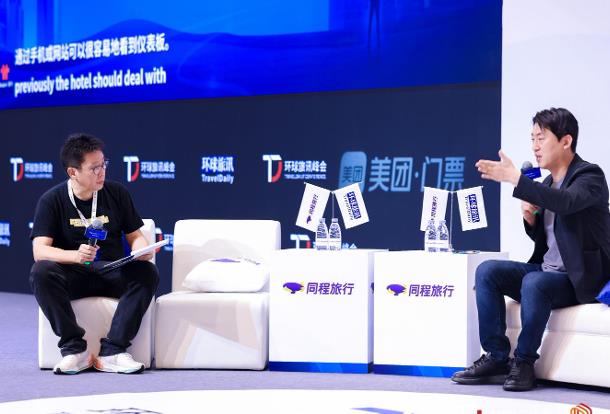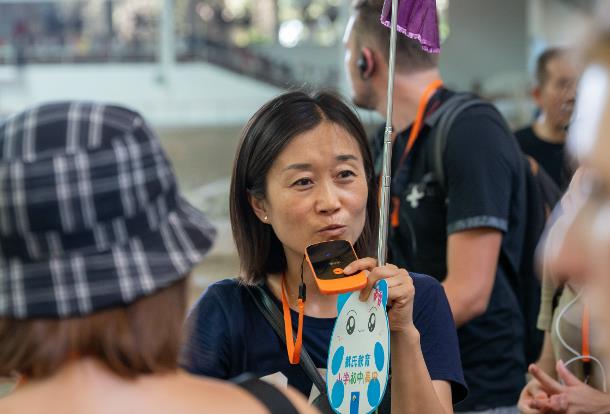ChinaTravelNews, Ritesh Gupta - A traveler’s experience of booking and staying with a hotel can go awry on several counts. Many of the existing pain points arise due to mismatch between expectations guests have and what eventually they experience during the course of their stay.
For instance, whether you booking via an OTA, meta-search or even brand.com, the information, images or videos that are shown or even reviews eventually fall short of expectations. An assessment or perception that is formed by a guest can go for a toss, and it doesn’t necessary depict a hotel’s fault. Even a traveler’s priorities can change – for instance, one books an economy seat, and when reaches the airport, thinking over the 8-hour long flight, the same traveler contemplates of an upgrade. So how to overcome such situations in today’s era?
As a technology start-up, Berlin, Germany-based conichi believes hotel companies can not only avoid such situations but they can also deliver personalized messages via an interface that travelers have chosen, a notification wouldn’t necessarily be deemed as an intrusion and rather it would depict value. This would be via “inexpensive” Bluetooth Beacon technology, hyper local marketing and GPS geo-fencing. In addition to optimizing key metrics around the guest experience, for hotels other gains include: leveraging digital assets such as their own mobile app or accounts on 3rd party ecosystem like WeChat, and make the most of precise data they have about travelers to target at least 20 percent incremental revenue.
Getting closer to being in control
Maximilian Waldmann, CEO of conichi, who quit Google to start this venture in 2014, believes a lot can go in favor of hotels just by saying a “hello” as guests enter hotel premises, and building on it.
“We observed challenges facing hotels – breakdown in personalization. Not a lot of information is passed on to you (as a guest) to fully know what the hotel has to offer,” said Waldmann. So conichi chose to work on beacon technology to recognize guests when they enter the premises, and is personally greeted with a message on a mobile device or allows reception say personalized greeting to guests. Of course, this is much better than reading a message on the TV screen after entering the room. Why? Simply because the check-in process is the first interaction or the first tangible experience at the property. A lot can go through a guest’s mind at this stage.
As I shared a personal experience around a stay at GLO Hotels’ property in Helsinki about how despite being fine with the room on brand.com and paying for it on booking.com fell short of expectations and eventually paying for the upgrade at the time of check-in (after checking out the original room), Waldmann explained that this is just one example where a preference evolved upon entering the hotel! It is time for hotels to gear up for any planned or unplanned move by delivering a frictionless, simple experience.
“How the front desk staff is doing when it comes to up-selling? What is the probability of a room being upgraded in a fast, easy way? Staff at the reception has a complex job, available time and resources are not enough to sell what all a hotel has to offer! Also, if they don’t know who you are and what you want then how can they offer you something that you are looking for,” pointed out Waldmann.
Also, considering the existing booking funnel and booking options, what if the guest wasn’t informed properly about a property and this peeved them as they experienced something indifferent. Waldmann mentioned that indeed requirements or metrics that need to be fulfilled from a guest’s (or travelers on the whole) perspective evolve during their exploration to booking to actual stay stage. “Now whatever data a hotel has, knowing your preferences (or even requests), if you initially booked a room being a price conscious traveler, and the hotel knows you tend to stay in a certain category, then why not give an option before the check-in?” Don’t compromise on experience is the message from Waldmann, who says that yes it isn’t possible for the staff at the front desk to check what all web pages you accessed while booking your room, but if precise, useful data is shared with the hotel then a lot can be salvaged before the damage happens. “We link data, time and availability to create a compelling offer,” he said.

Maximilian Waldmann, CEO of conichi
Delivering an intimate, non-intrusive experience
From being oblivious to what kind of experience one can have, conichi facilitates a personalized interaction with a simple greeting on the traveler’s mobile screen, and in case of a frequent or loyal traveler, a tailored offering can be presented. This is all the more important for Chinese travelers, considering their adoption of mobile services and the fact that there are more than 250 million Generation Y users. “For 80 percent of these customers, such service is a key decision point.” The possibility to say hello (that’s what conichi stands for) can do wonders, asserts Waldmann. He says personalisation isn’t about discounts or such promotional initiatives, rather it should be about recognizing who are you, what you like and how to deliver the best possible experience with what all the hotel has to offer, with critical points being timing, context and also the location of the traveler.
As for the efficacy of the tailored messages that are pushed in the form of a notification, Waldmann says currently opening rate is around 50 percent and conversion rate is around 55 percent, with food and beverages featuring at the top of the conversion list. “A guest might not be aware of what the hotel has to offer, or even for hotel it could be the case that the restaurants are experiencing enough guests on a day. How about looking at the preferences of the guest, crafting a tailored message for them and sending out an invitation to enjoy 20 percent discount on food on their hotel app or WeChat?” said Waldmann, who added that it is time chose to move on from irrelevant or unused marketing initiatives at a property level that guests aren’t receptive to.
The team at Conichi underlined the significance of sending messages that depicted value. “Higher the perceived value, better the conversion rate,” said Waldmann. So for instance, if you are a traveler who has booked a luxury room, and there is another traveler staying in a standard room, it needs to be ascertained what sort of offer needs to be delivered that matches your budget, the sort of experience you are looking for etc.
In addition to communicating with the guest within the property, geo-fencing allows hotels to be with the guest outside their premises. So, for instance, if a guest is passing by a café, then a message can pop up – enjoy your time and avail 50 percent off favorite coffee at this café! So there could be a revenue generation deal with different merchants/ parties, and the hotel can build on this proposition, too.
Other points to consider:
Even as hotels can count on technology for relevant messaging and incremental revenue, they can have certain questions such as following:
- Investment and integration: Waldmann mentioned that the cost of beacons is extremely low, with one beacon costing around 100 Yuan. “The marketing cost can be substantial when it comes to installing big screen or fancy marketing initiative. But here costs aren’t that high and also it is very transparent, flexible pricing. Hotels can pay around 10 Yuan per room per month,” he said. As for what sort of integration is there to push content or messages, conichi has worked out 2-way integration with property management systems (PMS) and with platform providers in China, with bunch of cloud platform providers having direct connections to PMSs.
- Acting on data: Considering the integrations that the team at conichi has worked on, Waldmann pointed the team is equipped to come up with best possible offer to the guest. “Considering the victory of Donald Trump (in the US elections) last year, is clear that social media can be leveraged, only a few data points are enough to cluster and send out targeted messages. We take social data from the application, plus from PMS and CRM, and act accordingly,” he said. Also, as hotels garner more and more data, it is important to act on this data. “If you download the app and as users end up sharing vital information about them, then with more such data points, this all becomes key to upselling. As every statistic indicates, personalisation fuels conversion rate.
Gearing up for China
“We are doing a major roll-out, not only beacon, but also total solution, with a couple of major hotel chains in China at the moment,” shared Waldmann, who added that the company currently has 10 people working in Shanghai office. The overall count of properties resulting from this roll-out would be 2000 in China, and most properties would get respective installations activated by the end of this year, he said. Outside China, conichi has 2000 installation featuring hotels from chains, and over 400 independent hotels.
“Consumers in China are showing a tendency – to leapfrog toward personalisation. And the driving factor is the comfort level with mobile devices. For instance, willing to purchase on mobile devices, say discount vouchers, when compared with consumers in Europe, is higher. Even the staff is tech-savvy in comparison here,” he said. As for challenges, he said a company needs to be ready to deliver to such a massive market. “If you look at WeChat, one step from any technology company and it opens up a massive chunk of users in China. WeChat integration is challenging. Also, considering more than 10-20 million hotel apps users out there…so to deliver at such scale, it’s a big step, complex step…took us a year to sort out (and be in a position to deliver what they have to offer). Understanding IT infrastructure is a huge challenge. Considering high mobile penetration, many mobile services – difficult to create the USP (unique selling points), being distinctive from the rest of the market – essential to convey the value. There could be a generic claim from many about the potential of location-based services, but it takes something to deliver conversions. Sending messages isn’t tough, but how to make it work?”
Continuing on IT, Waldmann said there can be hurdles at the server level for a company from Europe. “Due to data security, we need to separate server and server infrastructure. That was a complexity at our end. And of course, on the other side, it comes down to making the integration work with partners in China,” concluded Waldmann.




